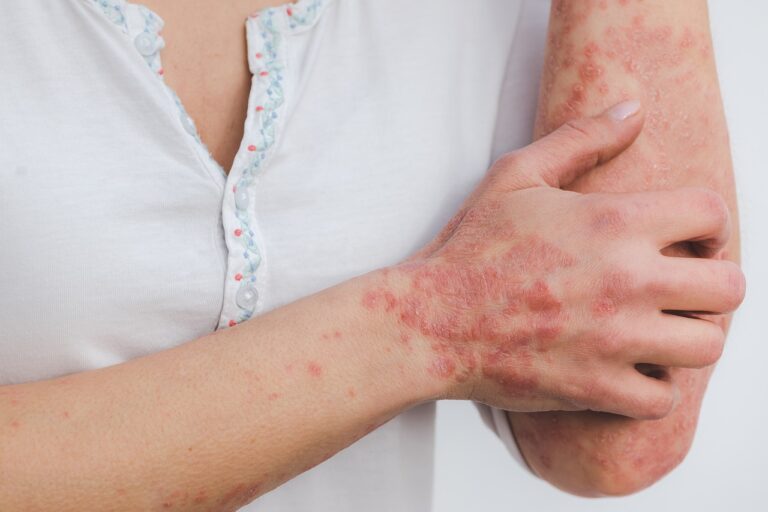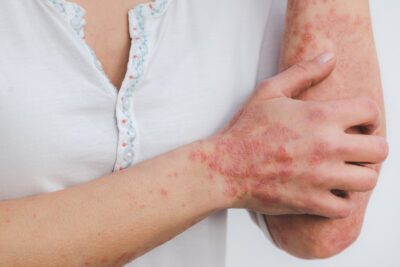November 5, 2024
Psoriasis is a chronic skin condition that affects millions of people. It causes itchy, red, and scaly patches on the skin. These patches can appear anywhere on the body but are most commonly found on the scalp, elbows, knees, and lower back. The condition varies in severity, with some people experiencing only minor irritation while others may have severe symptoms that impact their daily lives.
There are ways to find relief, from home remedies and lifestyle changes to medical treatments. By understanding the common triggers and causes, you can take steps to reduce flare-ups and improve your skin health. The following sections will explore these aspects to help you manage psoriasis effectively.
Understanding Psoriasis: An Overview
Psoriasis is more than just a skin issue; it’s a chronic disease that involves the immune system. When you have psoriasis, your immune system mistakenly attacks healthy skin cells, causing the body to produce new skin cells too quickly. This rapid cell turnover leads to thick, scaly patches on the skin’s surface.
These patches, known as plaques, are often red, itchy, and painful. They typically appear on the scalp, elbows, knees, and lower back. In some people, psoriasis may affect the nails, making them thick and ridged. Others may experience psoriasis arthritis, which causes joint pain and swelling.
Various types of psoriasis exist, with plaque psoriasis being the most common. Other types include guttate psoriasis, which appears as small, dot-like lesions, and pustular psoriasis, which causes white pustules surrounded by red skin. Each type has unique characteristics, but they all stem from the same underlying immune system issue. Learning about these types and their symptoms can help you identify and manage the condition more effectively.
Common Triggers and Causes of Psoriasis
While the exact cause of psoriasis remains unclear, certain factors are known to trigger or worsen the condition. Understanding these triggers can help you manage flare-ups and reduce symptoms.
Genetics:
– Psoriasis often runs in families. If your parents or siblings have the condition, you are more likely to develop it. Researchers have identified several genes linked to the disease, but genetics alone do not determine whether someone will have psoriasis.
Immune System:
– In psoriasis, the immune system turns against healthy skin cells, causing inflammation and rapid cell growth. This mistaken immune response is the root cause of the condition.
Environmental Factors:
– External factors like infections, skin injuries, and certain medications can trigger psoriasis. For example, strep throat can lead to guttate psoriasis, especially in children and young adults.
Stress:
– Emotional stress is a common trigger. High stress levels can cause flare-ups or worsen existing symptoms. Learning stress-management techniques can be beneficial.
Weather:
– Cold, dry weather can dry out the skin and trigger psoriasis, while sunlight can improve symptoms for some people. However, too much sun exposure can also trigger or worsen the condition.
Lifestyle Factors:
– Smoking and heavy alcohol consumption can increase the risk of developing psoriasis and can make symptoms worse. Maintaining a healthy lifestyle can help manage the disease.
Recognizing these triggers and causes is crucial for controlling psoriasis. By avoiding known triggers and taking preventive measures, you can reduce the frequency and severity of flare-ups.
Effective Home Remedies and Lifestyle Changes
Managing psoriasis doesn’t always require medication; some home remedies and lifestyle changes can also help. Here are some practical ways to reduce symptoms and keep your skin healthy.
Moisturize Regularly:
– Keeping your skin hydrated is crucial. Use thick creams or ointments to lock in moisture. Look for products with ingredients like aloe vera, shea butter, and ceramides, which help soothe the skin.
Take Warm Baths:
– Soaking in a warm bath with oils or Epsom salts can help relieve itching and remove scales. Make sure the water isn’t too hot to avoid irritating your skin further. Always moisturize right after bathing.
Avoid Harsh Soaps and Detergents:
– Use gentle, fragrance-free cleansers to avoid drying out your skin. Harsh chemicals and fragrances can cause flare-ups and irritation.
Maintain a Healthy Diet:
– Eating a balanced diet of fruits, vegetables, and whole grains can support your immune system. Omega-3 fatty acids in fish and flaxseeds may help reduce inflammation.
Manage Stress:
– Practise stress-management techniques like deep breathing, meditation, or yoga. Reducing stress can help prevent flare-ups and keep your symptoms in check.
Sunlight Exposure:
– Some people’s psoriasis can be improved by controlled exposure to sunlight. Always wear sunscreen to protect your skin from harmful UV rays, and start with short periods of sun exposure.
Medical Treatments and When to See a Dermatologist
While home remedies and lifestyle changes can be helpful, some cases of psoriasis require medical treatment. Knowing when to see a dermatologist is essential for effectively managing the condition.
Topical Treatments:
– Doctors often prescribe creams and ointments containing corticosteroids, vitamin D analogues, or retinoids. These medications reduce inflammation and slow cell production to help clear up plaques.
Phototherapy:
– Phototherapy involves exposing the skin to ultraviolet light under medical supervision. This treatment can reduce symptoms and improve skin appearance. It’s typically done at a dermatologist’s office.
Oral and Injected Medications:
– Doctors may prescribe oral or injected medications for moderate to severe cases. These drugs include biologics, methotrexate, and cyclosporine, which target specific parts of the immune system.
Combination Therapies:
– Sometimes, a combination of treatments may be most effective. Dermatologists tailor these plans to each patient’s needs, combining topical therapies, phototherapy, and systemic medications for better results.
When to See a Dermatologist:
– It’s time to see a dermatologist if your psoriasis symptoms are severe, if home remedies aren’t providing relief, or if the condition is affecting your daily life. Also, if you experience joint pain, you might have psoriasis arthritis, which requires professional treatment.
Timely medical intervention can help manage psoriasis more effectively, reducing symptoms and preventing complications.
Conclusion
Psoriasis is a complex and often challenging condition, but understanding its causes and learning how to manage it can make a significant difference. From recognizing common triggers to exploring effective home remedies and medical treatments, there are numerous ways to keep symptoms under control and enhance your quality of life.
Maintaining a healthy lifestyle, moisturizing regularly, and managing stress are crucial first steps. However, knowing when to seek professional help is equally important. Dermatologists can provide tailored treatments that address your specific needs, offering better management of your symptoms.
At VIDA Dermatology, we specialize in medical and cosmetic dermatology to help you achieve healthy, glowing skin. Our experienced skin specialist in Edmonton is dedicated to providing personalized care for conditions like psoriasis. Don’t hesitate to reach out if you’re struggling with psoriasis and need expert guidance. Book an appointment with VIDA Dermatology today and take the first step towards better skin health.



